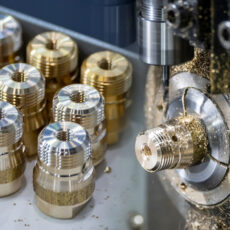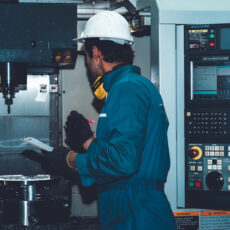Smart factories have revolutionized the manufacturing industry by integrating advanced technologies to optimize production processes. One crucial aspect that drives the success of these factories is the industrial machinery and tooling used. Innovations in this area have led to increased efficiency, productivity, and overall operational excellence. In this blog post, we will explore some of the latest advancements in industrial machinery and tooling that are transforming smart factories.
 1. Robotics and Automation:
1. Robotics and Automation:
Robots have become an integral part of modern manufacturing processes. With the advancements in robotic technologies, they can perform tasks with precision and speed. They work alongside human workers, assisting them in various tasks, including assembly, packaging, and material handling. Collaborative robots, also known as cobots, have gained popularity as they can work safely alongside humans without the need for safety barriers. These robots are equipped with sensors and AI algorithms that enable them to adapt to changes in the environment and work collaboratively with human operators.
2. Additive Manufacturing:
Additive manufacturing, also known as 3D printing, has revolutionized the way products are designed and manufactured. It enables the creation of complex geometries and the production of personalized, customized products with less waste. This technology has found applications in various industries, from automotive and aerospace to healthcare. In smart factories, additive manufacturing allows for rapid prototyping, on-demand production, and the ability to produce spare parts with ease. This leads to reduced lead times, increased agility, and cost savings.
3. Internet of Things (IoT):
The Internet of Things (IoT) has transformed how industrial machinery and tooling operate within smart factories. By connecting machines and equipment to a network, manufacturers can collect real-time data and monitor the performance of various assets remotely. This data can be analyzed to identify potential issues, predict maintenance needs, and optimize productivity. IoT also enables machines to communicate with each other, facilitating seamless integration and coordination within the production process.
 4. Artificial Intelligence (AI):
4. Artificial Intelligence (AI):
Artificial intelligence has opened doors to new possibilities in industrial machinery and tooling. Machine learning algorithms can analyze vast amounts of data to identify patterns, detect anomalies, and make predictions. AI-powered machinery can optimize parameters, self-diagnose problems, and adjust settings autonomously. For example, AI-enabled robotic arms can learn from human operators and perform complex tasks efficiently. This improves production quality, reduces downtime, and enhances overall operational efficiency.
5. Augmented Reality (AR):
Augmented reality has emerged as a valuable tool in industrial machinery and tooling. With AR, operators can visualize complex tasks, assembly processes, and maintenance procedures. Real-time instructions and guidance can be overlaid on physical objects, leading to reduced errors and improved efficiency. AR can also provide remote assistance by allowing experts to guide workers or troubleshoot issues from a distance. This technology enhances training, reduces training costs, and improves worker productivity.
6. Data Analytics and Predictive Maintenance:
By leveraging data analytics, manufacturers can gain actionable insights into their machinery’s performance and predict potential failures. Predictive maintenance uses machine learning algorithms to monitor and analyze data from sensors and equipment, identifying patterns that indicate impending failures. By preemptively scheduling maintenance or repairs, downtime can be minimized, and costly breakdowns can be avoided. The ability to accurately forecast maintenance needs leads to increased equipment longevity and improved productivity.
 7. Collaborative Systems:
7. Collaborative Systems:
Collaboration between humans, machines, and systems is crucial in smart factories. Industrial machinery and tooling are now designed with built-in intelligence and connectivity, enabling them to seamlessly interact with other components of the production process. For example, machines can automatically adjust settings based on real-time inputs from sensors to ensure optimal performance. Collaborative systems foster a flexible and efficient production environment, enabling faster response times, improved product quality, and increased productivity.
Summary
Innovations in industrial machinery and tooling have been instrumental in the transformation of smart factories. Robotics and automation, additive manufacturing, IoT, AI, AR, data analytics, predictive maintenance, and collaborative systems have contributed to increased efficiency, productivity, and operational excellence. As technology continues to evolve, we can expect further advancements in industrial machinery and tooling, driving continuous improvement in the manufacturing industry.

